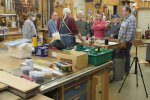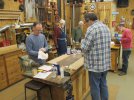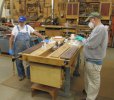This is to announce the French Polishing Workshop the first of the advanced workshops.
We will cover all of the steps of this process from materials, material preparation and application.
The workshop will take six participants and depending on interest we may offer it again. If you are on the wait list for the introduction to finishing workshop you’re still on that list and it will be offered again later this year. This is a separate workshop and hence the new sign up sheet.
it will be held on March 18th starting at 10am until probably around 3 or 4 pm. Place will be Bill Clemmons shop in the greater Metro of Liberty NC.
we will order pizza for lunch, or if you like you can bring your own.
This is a workshop I have really looked forward to doing, and I look forward to seeing everyone there.
Signed up
Wait-list
We will cover all of the steps of this process from materials, material preparation and application.
The workshop will take six participants and depending on interest we may offer it again. If you are on the wait list for the introduction to finishing workshop you’re still on that list and it will be offered again later this year. This is a separate workshop and hence the new sign up sheet.
it will be held on March 18th starting at 10am until probably around 3 or 4 pm. Place will be Bill Clemmons shop in the greater Metro of Liberty NC.
we will order pizza for lunch, or if you like you can bring your own.
This is a workshop I have really looked forward to doing, and I look forward to seeing everyone there.
Signed up
| Username | Given Name |
|---|---|
| JLimey | Jeff |
| Partman | Danny |
| Creasman | Jim |
| Roger45 | Roger |
| EricS | Eric |
| JRedding | John |
Wait-list
| Username | Given Name |
|---|---|
| HMerkle | Hank |
| Charlie Buchanan | Charlie |
| Michael Mathews | Michael |
Last edited by a moderator:



